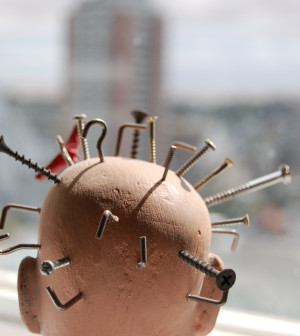- The Best Time of Day to Drink Bone Broth to Maximize Health Benefits
- 8 Ways to Increase Dopamine Naturally
- 7 Best Breads for Maintaining Stable Blood Sugar
- Gelatin vs. Collagen: Which is Best for Skin, Nails, and Joints?
- The Long-Term Effects of Daily Turmeric Supplements on Liver Health
- Could Your Grocery Store Meat Be Causing Recurring UTIs?
- Are You Making This Expensive Thermostat Error This Winter?
- Recognizing the Signs of Hypothyroidism
- 10 Strategies to Overcome Insomnia
- Could Artificial Sweeteners Be Aging the Brain Faster?
Stroke Survivors Deserve Team Care: Statement


Palliative care that minimizes suffering and improves quality of life should be provided to patients who’ve survived a stroke, experts say.
The care should be a team effort involving patients, families, stroke specialists and health care providers such as neurosurgeons, neurologists, primary care doctors, nurses and therapists, according to the new scientific statement from the American Heart Association (AHA) and American Stroke Association (ASA).
“The majority of stroke patients need access to some form of palliative medicine,” statement lead author Dr. Robert Holloway, chairman of the neurology department at the University of Rochester Medical Center in Rochester, N.Y., said in an AHA/ASA news release.
“The stroke team and its members can manage many of the palliative care problems themselves. It encourages patient independence and informed choices,” he explained.
The statement appears March 27 in the journal Stroke. It says that as a stroke patient or family member, you should expect your health care providers to discuss your preferences, needs and values in relation to medical decisions, and to ask what aspects of recovery are most important to you.
These professionals should also clearly outline the prognosis and provide information on how to deal with physical or mental disabilities caused by stroke. In addition, health care providers should fully explain treatment choices such as CPR, ventilators, feeding tubes, surgery, natural feeding, do-not-resuscitate orders and do-not-intubate orders, the AHA/ASA says.
Health care providers should know the best ways to treat common post-stroke physical symptoms such as pain, and mental health symptoms such as depression and anxiety. They should seek the help of a palliative care specialist if necessary, and help preserve patients’ dignity and maximize their comfort.
“Stroke is a devastating disease that has received little attention in the area of palliative care so far,” Holloway noted.
Each year in the United States, nearly 800,000 people suffer a stroke and about 130,000 die from it, according to the AHA/ASA. Permanent disability occurs in up to 30 percent of stroke survivors.
More information
The National Stroke Association has more about stroke recovery.
Source: HealthDay
Copyright © 2026 HealthDay. All rights reserved.










